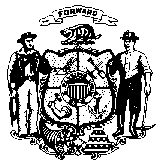

WISCONSIN LEGISLATIVE AUDIT BUREAU
AUDIT SUMMARY
Report 98-1
January 1998
TAXATION OF VENDING MACHINE SALES
A proposal to replace the existing sales tax on food and beverages sold through vending machines with an annual permit fee assessed on each machine was considered by the Legislature during 1997-99 budget deliberations. The proposal was developed by an industry group, the Wisconsin Automatic Merchandising Council, to simplify tax administration for its members and to rectify perceived tax inequities related to the sale of prepared food through vending machines and over the counter at retail establishments. Another industry group, the Wisconsin Soft Drink Association, opposes the proposal, which it believes would reduce the number of vending machines in operation and result in a net revenue loss to the State. 1997 Wisconsin Act 27 directed the Legislative Audit Bureau to study the fiscal effect of the proposal, the feasibility of its implementation, and whether its constitutionality could be challenged.
To Be Revenue Neutral, the Proposed Permit Fee Would Need to Be Increased
The precise fiscal effect of the permit proposal cannot be determined because vending machine sales tax revenues are not recorded separately by the Department of Revenue, and information about the number of vending machines in Wisconsin, their annual sales, and compliance with both the current sales tax and the proposed permit system must be estimated. Earlier estimates, including those made by the Legislative Fiscal Bureau, have been disputed by proponents and opponents of the proposal.
To develop new estimates of the permit proposal's fiscal effect, we used updated data from other states, as well as information on vending machine sales at a number of Wisconsin schools, businesses, and other entities. Our estimates suggest the proposed fee of $65 per machine would result in a net revenue loss to the State. To be revenue neutral, the permit fee would need to be increased to $123 per machine. However, if current tax compliance in the vending industry exceeds our estimate of 55 percent, or if compliance with a permit system were to be below our estimate of 95 percent, the State would experience a net revenue loss even with a fee of $123 per machine. Furthermore, unless the amount is adjusted annually to account for changes in the prices and volume of items sold through vending machines, even the increased fee will result in future revenue losses.
Counties That Impose a Local Sales Tax Could See Their Revenues Decrease
In the 49 counties that impose a local sales tax, vending machine operators have an average tax liability of $20 per machine, based on average sales volume. However, under the permit proposal, counties would be reimbursed $1 per machine from the permit fee. To keep the permit fee revenue neutral for both the State and the counties, the fee amount would need to be increased beyond the $123 per machine in the counties that impose the local sales tax.
The Permit System Could Be Administered by the Department of Revenue
The proposal envisions that central administration of the permit system would be provided by the Department of Revenue, but local governments could sell permits and enforce compliance under contract with the Department. We found few of Wisconsin's larger cities that responded to our survey would voluntarily provide local program administration for the administrative allowance envisioned in the proposal. However, the Department of Revenue has indicated it would provide both central and local administration and enforcement within the proposed allowance of $8 per permit.
The Proposal's Effect Will Differ for Different Industry Sectors
Under the proposed permit system, companies whose only business is food and beverage vending would enjoy a simplification of their tax payments. Businesses that have a combination of vending sales and other retail sales, however, would need to monitor and report sales more carefully. The proposal would mean a cost savings for vending machine operators who are in full compliance with current sales tax requirements, because the proposed fee is below their estimated sales tax liability. On the other hand, soft drink bottling companies may experience a cost increase because competition in their industry may allow vending machine operators to shift the cost of permits to the bottlers during contract negotiations.
A Permit Fee Appears to Be Constitutional
Because the proposal would require vending machine operators to pay the same fee even though their revenues could differ, constitutional questions concerning due process and equal protection could be raised. We note that no constitutional challenges have been raised in the two other states that have implemented vending machine permit systems. In addition, Legislative Council attorneys have indicated that a court is likely to categorize the vending machine permit fee as a tax; tax laws typically carry a strong presumption of constitutionality; and Wisconsin courts have generally recognized that absolute equality in tax law is impossible. Therefore, it appears there are no significant constitutional impediments to the Legislature enacting a vending machine permit fee.
****
| View Full Summary | Go to LAB Reports Page | Go back one page |